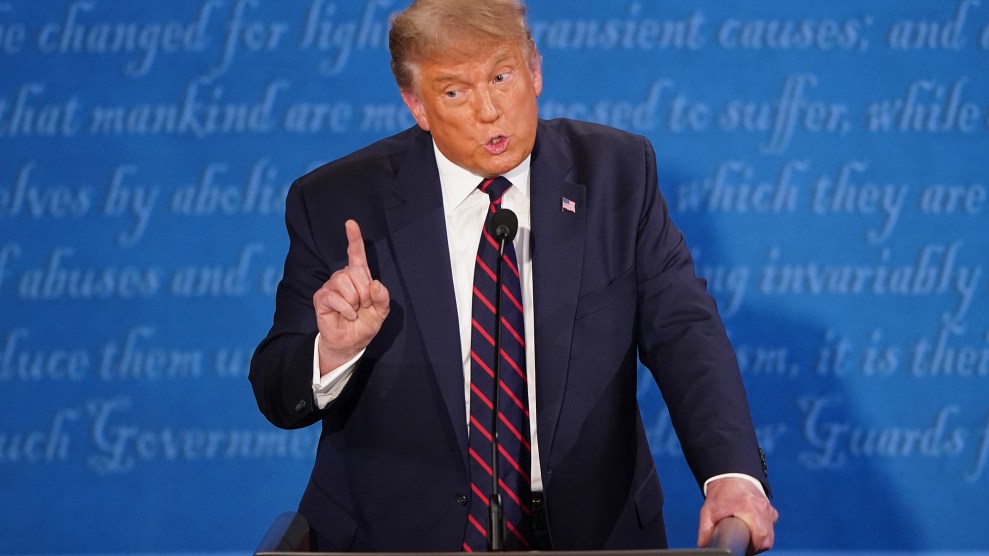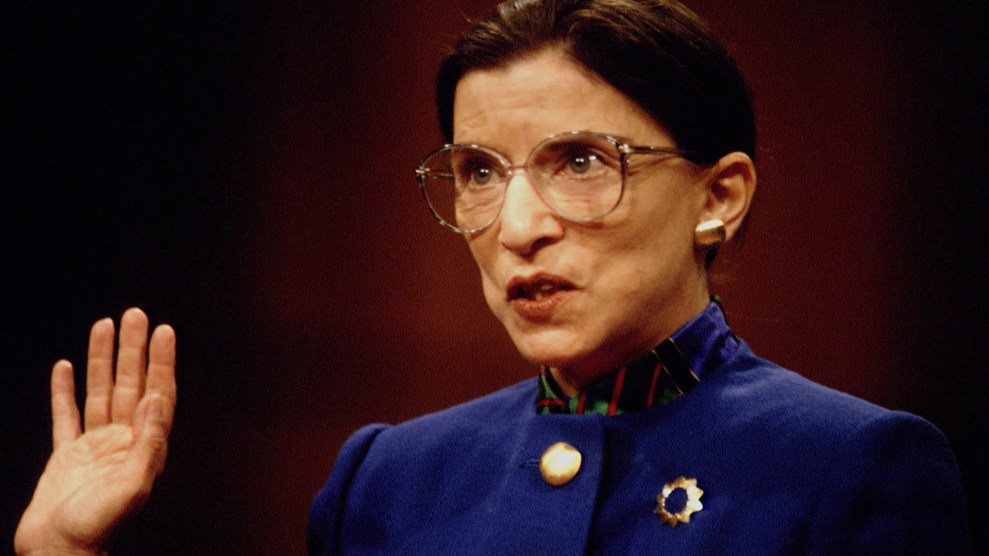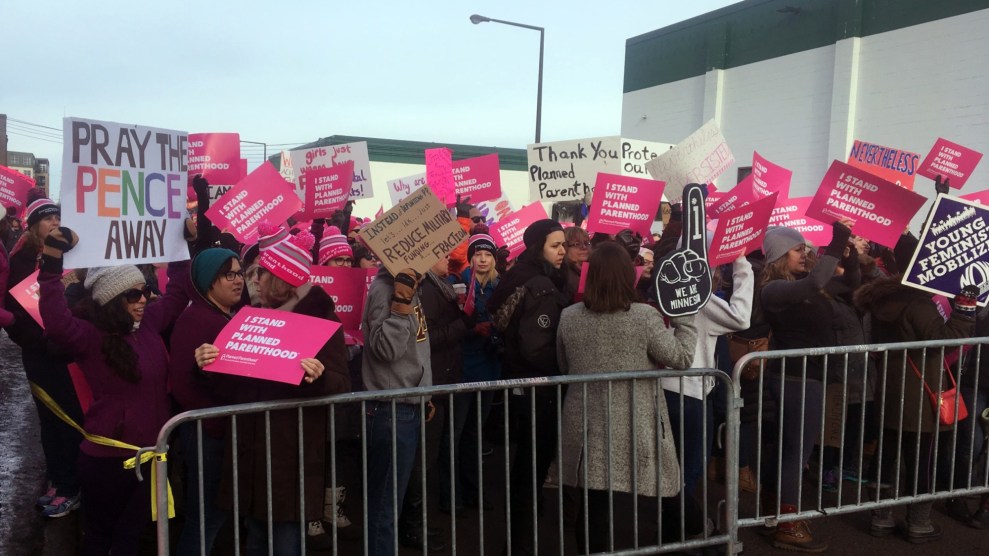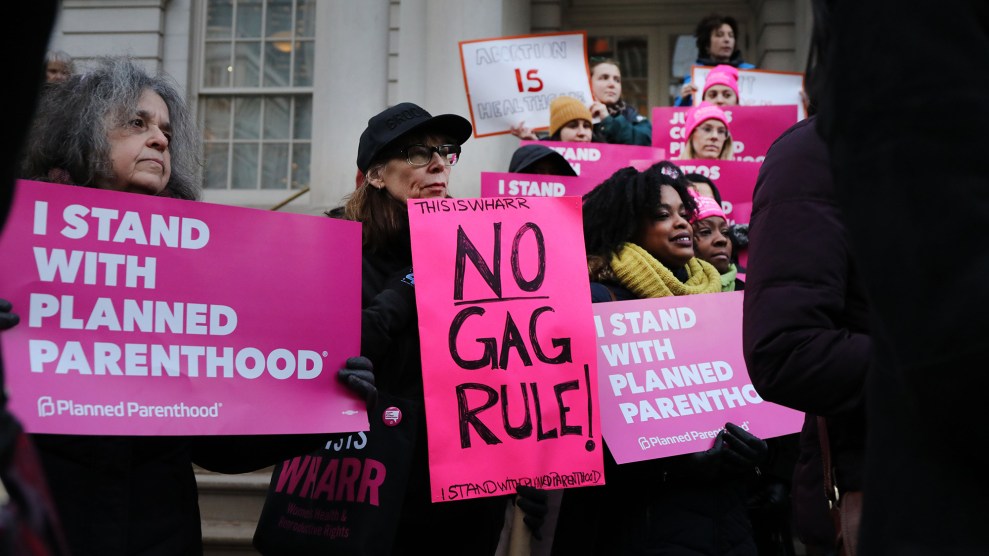This story was produced in partnership with Type Investigations.
On a rainy morning in May 2019, Dr. John Nyamu was attending to patients on the cluttered first floor of an office building in downtown Nairobi when he heard raucous shouts from down the street. A caravan of protesters was winding toward him, a few hundred people teeming in the streets, bellowing through loudspeakers, and stopping traffic.
As the crowd reached his building, Nyamu, a well-known gynecologist who performs abortions in a private clinic, peered through his window at the protesters below to make out what they were saying. It turns out they were targeting him. “Abortion is murder! Abortion must go! Nyamu must go!” Some held signs with photos of mutilated fetuses. Others clutched baby-size cardboard coffins with crosses on them.
Such a scene may not surprise Americans, who are familiar with the impassioned debate surrounding abortion. But Nyamu, who has been providing abortion services in Kenya for nearly 30 years, says these tactics are new to Kenya. Virulent anti-abortion activity is not more than a few years old there—the result of a campaign by the Trump administration and ultra-conservative American groups to export Operation Rescue–style tactics to the rest of the world. Over the past three years, President Trump has decimated funding to family planning groups across sub-Saharan Africa, leaving many fighting to survive. More quietly, he has also planted far-right ideologues as the heads of federal agencies crafting international policy on the rights of women and bolstered the work of nongovernmental organizations seeking to make abortion illegal worldwide. Kenya has long had restrictive abortion laws—the procedure is illegal except in a handful of circumstances. But Trump’s agenda has turbocharged Kenya’s nascent anti-abortion movement, which is working to add more limitations to the country’s already stringent laws.
This means the stakes in the upcoming US presidential election are high, not only for Americans but also for women and girls around the world, including in Kenya. Even if the presidency goes to former Vice President Joe Biden, who has pledged to undo Trump’s funding cuts on the first day of his presidency, the damage may not be so easily undone. The impact of the Trump administration’s agenda has momentum far beyond Trump himself.
The demonstration outside Nyamu’s office had been organized by several groups, including CitizenGO, an ultraconservative group headquartered in Spain but partially financed by US donations, which styles itself as the conservative MoveOn. Most famous for the 2017 campaign over the terminally ill British child Charlie Gard and transphobic “free speech buses” it deployed to at least nine countries including Kenya (its first target on the African continent), CitizenGO, which claims 9 million members worldwide, began as a petition mill but has increasingly mounted IRL events to promote its brand of “family friendly” policies.
The African face of CitizenGO is Ann Kioko, a 32-year-old Kenyan with round cheeks, a petite stature, and a deep commitment to religious conservatism. Kioko recently attended workshops conducted by the American Leadership Institute, a conservative training organization that counts Vice President Mike Pence, Sen. Mitch McConnell (R-Ky.), and Karl Rove among its alumni. “CitizenGO works very closely with the Leadership Institute,” says Kioko, who is on the board of Kenya’s Conference of Catholic Bishops in addition to being CitizenGO Africa’s campaigns director. “We are receiving training from them every other year on how to do campaigns, especially political campaigns. Because the future of the pro-life movement, and this is the goal of CitizenGO right now, is to make sure we elect pro-family people.”
Kioko’s American connections don’t stop there. She moderated a conference in the US hosted by the Center for Family and Human Rights, an influential Catholic nonprofit known as C-Fam. It lobbies against abortion and LGBTQ rights, and the Southern Poverty Law Center has labeled it a hate group for its demonization of gay people. In March 2019, at the invitation of the State Department, Kioko attended the International Women of Courage Award ceremony presided over by Secretary of State Mike Pompeo and first lady Melania Trump. Donning a dress made of Kenyan kitenge fabric, Kioko posed behind the podium onstage for photographs and shook hands with global women’s activists from around the world.
“What I can say about the government right now of the United States is that it is helping African women by defunding these very notorious pro-abortion organizations,” Kioko tells me. The anti-abortion movement in Kenya is “very happy and grateful to the Trump administration right now.”

Trump owes his election in no small part to conservative Christians, and accordingly has empowered anti-abortion groups not just at home but around the world. In one of his first acts as president, he barred foreign NGOs from receiving funding from the US government if they go so far as to share information on abortion, let alone perform them. The policy, known by critics as the Global Gag Rule, was first enacted by President Ronald Reagan in 1984, and has been rescinded by Democratic presidents and reinstated by Republicans ever since.
But Trump’s iteration is the most extreme ever enacted, applying to more than $12 billion in funding from international NGOs in its first year, including $600 million for health care and family planning organizations in Kenya. The Gag Rule was initially applied only to family planning grants from the United States Agency for International Development (USAID), but the Trump administration expanded it to include health-related grants from any federal department or agency, including, for the first time, money earmarked for programs addressing HIV/AIDS. Previous Republican administrations had left those programs—which helped contain a continent-wide public health catastrophe—alone. The Trump administration also defunded the United Nations Population Fund (UNFPA), which helps countries with reproductive health and family planning. In 2016, the US government was UNFPA’s third-biggest donor country, giving more than $63 million; starting in 2017, it gave nothing.
As in the United States, abortion clinics in Kenya do a lot more than help women end pregnancies. They’re full-service reproductive health and family planning organizations, offering cervical cancer screenings and immunizations, contraception, and prenatal and obstetric care. Making sexual health services widely available and affordable for women would have a huge trickle-down effect in low- and middle-income countries—reducing unintended pregnancies, unsafe abortions, and maternal deaths by about two-thirds, according to one study. But the Gag Rule puts these clinics in a bind: choose to stop offering abortions and even information about abortions performed elsewhere, or lose crucial US government funding and risk shutting down entirely.
The Trump administration’s method of choking off funding to reproductive health and family planning organizations to eliminate abortions has left clinics with limited resources and little recourse. “First thing was cut off all the money, try to strangle it right away,” says a former State Department official who worked with the US delegation to the UN under three administrations and requested anonymity. “’Well, then who’s going to provide the maternal services? Who’s going to do the prenatal checkups? Who’s going to deliver the baby?’ And there was clearly, in Washington, no plan. No thought had been given…No answer, month after month. No answer because they didn’t care.”
As a result, reproductive health groups in Kenya are struggling to survive. Family Health Options Kenya, one of the country’s oldest family planning organizations, opted to continue offering abortions. (All the abortion providers mentioned in this story operate legally.) The organization had 16 clinics across the country, including one deep in the heart of Kibera, Kenya’s largest slum. Nestled between tin-roofed shanty houses, its peeling, light blue banner advertises discounted, high-quality reproductive health services to the communities no else reaches. Yet it has lost $2.2 million in US support since 2017, including around $640,000 in HIV/AIDS prevention services. Gag Rule funding cuts have forced it to fire more than 40 of its 180 project and clinical staff members, including some in its Kibera location; it has closed four clinics since Trump took office and limited its mobile outreach services. FHOK’s director of clinical services estimates that about 76,000 women have missed out on services as a result of the mobile clinics shutting down.
The Kisumu Medical and Education Trust, a network of over 350 health providers focused on expanding access to abortion care, has similarly lost a significant portion of its funding—some 45 percent. “We are struggling. We are like orphans,” Monica Oguttu, the trust’s executive director, told me last year. “You lose the funding. Then the entire system is just completely collapsed because the clinics you are supporting, nobody is funding. The problem we have is that we don’t have partners or foundations that would even match what USAID was giving.” When I spoke with her again in early 2020, Oguttu told me she had to lay off 10 staff members. “It’s getting worse,” she said.
Traffic was gridlocked in Nairobi’s city center on November 12, 2019, and hotels and restaurants across town were fully booked for the week. It was the 25th anniversary of the International Conference on Population and Development (ICPD), a summit on the rights of women and girls convened by UNFPA and the governments of Kenya and Denmark.
Within the grounds of the Kenyatta International Conference Center, some 8,300 doctors, humanitarians, religious leaders, feminist activists, and politicians greeted each other as music floated across the massive, open-air venue, decked out with purple and orange banners.
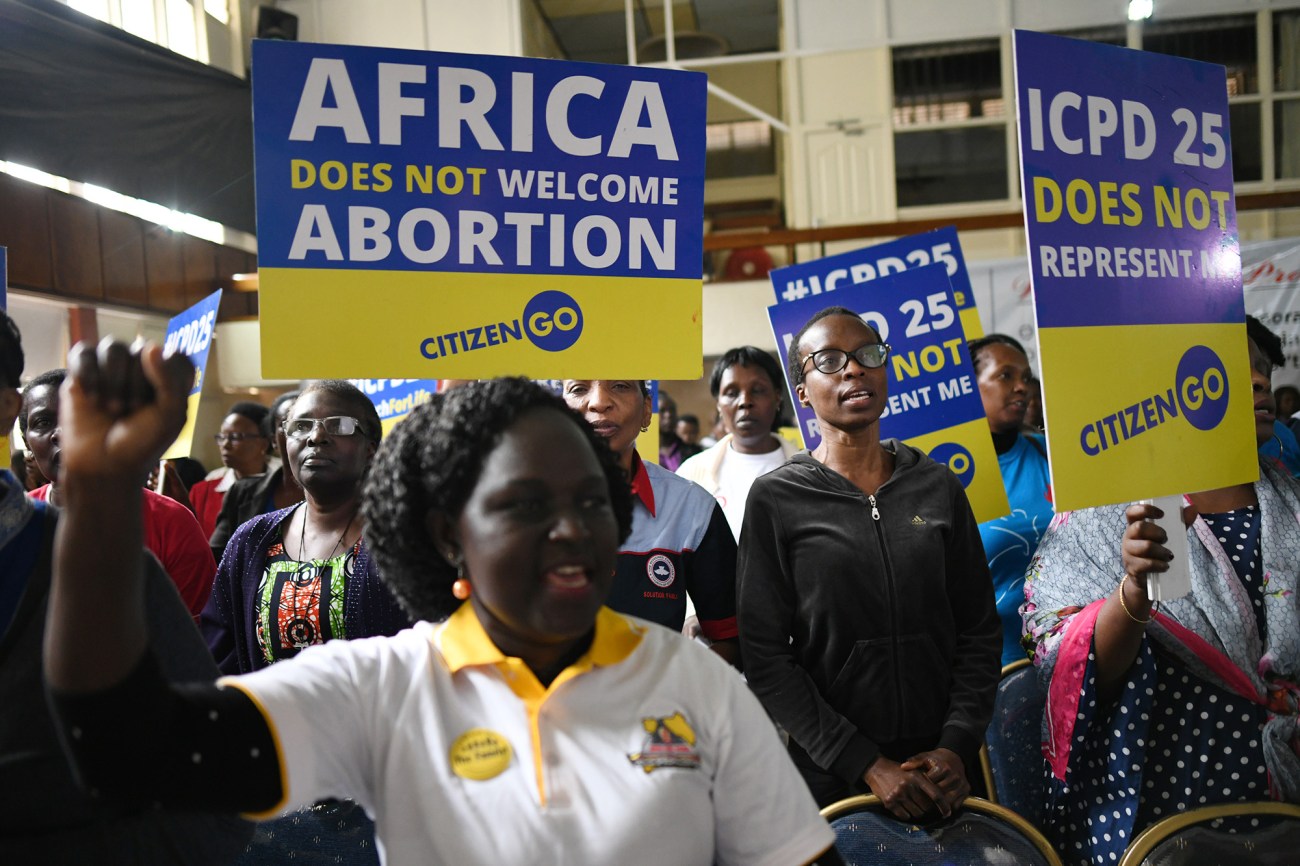
Anti-abortion activists during a rally organized by CitizenGO to protest the International Conference on Population and Development in Nairobi on November 14, 2019.
Simon Maina/AFP/Getty
Not everyone was feeling festive. While the summit was underway, the US ambassador to Kenya, Kyle McCarter, an evangelical former Illinois state senator and Trump appointee, thundered that the conference was being hijacked by “pro-abortion groups [who were] using it as a vehicle to try and further their agenda.” During the week of the conference, McCarter penned an op-ed published in at least three Kenyan newspapers announcing an alternate event “to bring more diversity of opinion into the conversation.” This alternate event was a counter-conference organized by CitizenGO, and attended by C-Fam and a handful of other American anti-abortion organizations. Throughout the week, its attendees gathered across the street from where the ICPD25 was being held, waving plastic dolls covered in fake blood and signs reading “Africa does not welcome abortion.” Their competing conference, branded as a pro-family alternative to the ICPD25, offered discussion panels and screenings of Unplanned, a 2019 film about the former Planned Parenthood clinic director turned anti-abortion activist Abby Johnson, who spoke at this year’s Republican National Convention.
At the counter-conference, C-Fam’s executive vice president, Lisa Correnti, told me, “It’s very clear that there’s a real sexual agenda being proposed, and it’s being disguised very well under promoting the health and well-being and empowerment of women and girls.”
It was no coincidence that C-Fam executives were in attendance. C-Fam has been angling for international influence for decades. It was founded in 1997 with a grant from Human Life International, an organization founded by a Catholic priest who believed the pro-choice movement was run by Jews committing a second Holocaust. C-Fam’s current leader, Austin Ruse, a Catholic writer and activist, is only slightly less radical. Ruse has thick, arching eyebrows, a mop of curly, graying hair, and a penchant for bigotry: In 2014, he told American Family Radio listeners that the “hard left, human-hating people that run modern universities” should “all be taken out and shot,” prompting a priest on C-Fam’s board to resign in protest. In 2016, Ruse allied with Iran, Saudi Arabia, and Russia to lobby against a UN proposal to investigate anti-LGBTQ violence, calling the plan a “major catastrophe” and a win for “sexual revolutionaries [who] are about to defeat the forces of truth and goodness.”
Ruse is honest about C-Fam’s objectives. “We were founded and have worked for 23 years to 1) block a global right to abortion, 2) maintain a proper definition of the family, 3) stop sexual orientation and gender identity from becoming new categories of nondiscrimination in international law,” Ruse told me in an email. “We have been successful in all three.”
Much of this success has actualized over the past four years. With Trump’s inauguration, C-Fam finally got what it wanted: a place in the official US delegation to the UN. In March 2017, the State Department chose Correnti to represent the United States during the UN’s Commission on the Status of Women, a two-week session that the department described as “the most important annual meeting on women’s issues at the United Nations.”
“As soon as the Trump administration got in place, C-Fam started calling, having meetings, trying to direct what the administration should do,” the former State Department official says. “And the newly appointed conservatives in the administration were so open, they would take, unquestioningly, without even repackaging, what they got from C-Fam and just deliver it straight to us as our negotiating strategies.”
Ruse maintains that while the Trump administration is “open and willing to listen to all points of view,” C-Fam is not the driving force behind the administration’s anti-abortion stance. “We follow. We do not lead,” he says. But two Trump appointees have been particularly eager to help C-Fam realize its agenda. During the 2018 Commission on the Status of Women, Bethany Kozma, formerly an adviser at the USAID Office of Gender Equality and Women’s Empowerment who was recently promoted to USAID’s deputy chief of staff, attended a listening session with C-Fam, according to the Guardian. Kozma and the other American representatives were given talking points, written by C-Fam, which they were told to use while hammering out policy. The instructions laid out that the delegates should advocate against mentioning “sexual and reproductive health” and “gender” in UN documents.
Red-haired and stern-faced, Kozma was tapped to work at USAID for the Trump administration after serving in the White House and Department of Homeland Security during the Bush administration. When Trump appointed Kozma, C-Fam’s Ruse told BuzzFeed News, “Bethany Kozma is a lovely, sweet woman who just happens to believe that girls with penises just ought not to be showering next to girls without penises,” referring to an article Kozma wrote for the Daily Signal, a Heritage Foundation publication, in which she advocated against trans kids using the school bathrooms of their choice. In the piece, Kozma argued that predators could take advantage of the Obama-era bathroom policy to “hurt children.” (There is no evidence that indicates that this would happen at a higher rate with a nondiscrimination law on the books.) USAID did not respond to multiple requests for comment.
In addition to Kozma, C-Fam has worked closely with Valerie Huber, the special representative of global women’s health at the Department of Health and Human Services. Huber was once the head of Ohio’s abstinence education program, which included a curriculum that warns that teenagers who have premarital sex should “be prepared to die.” Before her appointment, Huber had lobbied HHS officials to ax its Office of Adolescent Health. As a member of the administration, she appeared as a special guest at C-Fam’s screening of the anti-abortion film Strings Attached, which describes US involvement in African health care as “ideological colonialism” and alleges that Marie Stopes, an international organization akin to Planned Parenthood, performs illegal abortions.
C-Fam couldn’t be happier about having a direct line to the Trump administration. President Trump leads “the most pro-life administration we have ever worked with,” Ruse wrote in an email to me. “We have known Bethany Kozma and Valerie Huber for years, long before they joined the administration…[T]hey are both great women and true American patriots.”
Kozma and Huber were both official representatives of the American government at the ICPD conference in Nairobi last year. During the conference, both women crossed the street to also attend the anti-abortion conference. At one counter-conference panel, Kozma told anti-abortion, faith-based organizations how to successfully apply for USAID grants, walking through the process step by step. She handed out pamphlets entitled “Doing Business with USAID,” which highlighted what is called the New Partnerships Initiative, a program launched in May 2019 to fund local aid organizations that traditionally have not received US funding. No such presentation was given to the organizations attending the ICPD25.
On the morning the ICPD conference concluded, the US delegation, including Huber, and McCarter, held a press conference along with delegates from Brazil, Hungary, Libya, Poland, and Uganda to condemn some of its key priorities: “We do not support references in international documents to ambiguous terms and expressions, such as ‘sexual and reproductive health and rights,’ which…may be used to actively promote practices like abortion,” Huber announced to a room full of reporters. “There is no international right to abortion.”
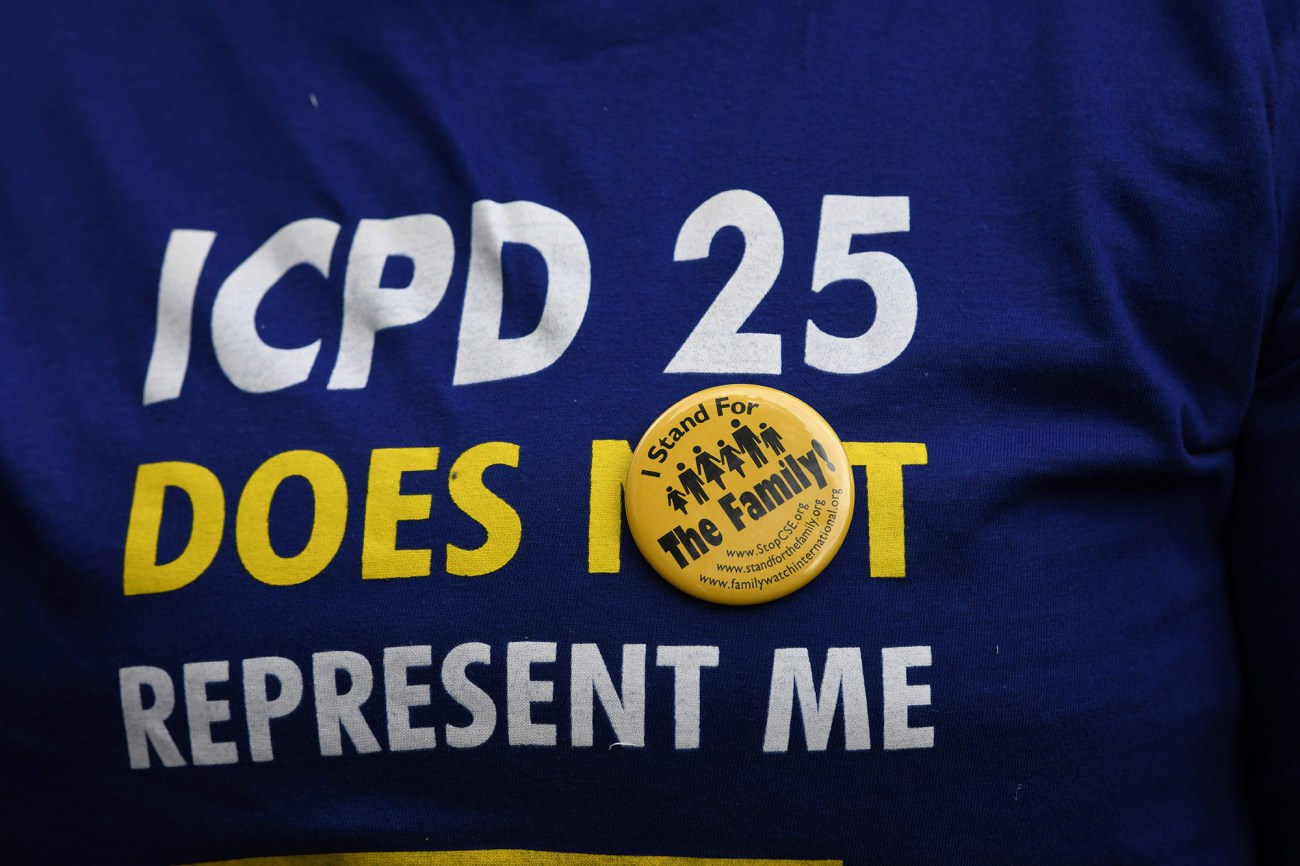
Ahead of the ICPD25, CitizenGO delivered more than 68,000 signatures to the president of Kenya, Uhuru Kenyatta, to remove support for the summit.
Simon Maina/AFP/Getty

Paradoxically, all of these efforts could mean an increase in abortion—dangerous ones in particular. During the tenure of President George W. Bush, who also instituted a version of the Gag Rule, abortions, particularly those using unsafe procedures, increased by 40 percent in sub-Saharan African countries.
The same cause and effect is at work today. A July study in the Lancet found that abortion rates have increased by 12 percent in countries where access to the procedure is restricted, while in countries where it is broadly legal, the rate has declined slightly.
Though data on unsafe abortions in Kenya is not yet available for the past few years, six health care organizations and experts in the country told me they are seeing a spike in unqualified practitioners performing abortions with tools such as knitting needles, as well as women ingesting traditional herbs, crushed glass, or bleach to terminate pregnancies. These methods kill an estimated 28 women and girls in Kenya each week; many more seek treatment for complications such as sepsis or organ failure. But it’s increasingly difficult for clinics to care for women experiencing complications from illegal abortions, due to both funding cuts and rising pressure from anti-abortion groups.
Marie Stopes, the Planned Parenthood-like women’s health organization, has been a particularly high-profile target. In mid-2017, CitizenGO began attacking Marie Stopes Kenya on social media and launched a petition against the organization, accusing it of promulgating an “illegal trade of killing babies” in the country and demanding it be investigated and banned. A year later, executives from Marie Stopes were called in front of Kenya’s Medical Practitioners and Dentists Board, which ordered its clinics to immediately halt the provision of all abortion-related services.
The ban was lifted a month later, but the damage had been done. Marie Stopes estimates that its post-abortion care services, which regularly include patients who have attempted to end their own pregnancies, dropped by approximately 10 percent in 2018, meaning around 6,000 requests for service went unfulfilled in that year alone.
“Unsafe abortion remains one of the leading causes of maternal mortality in Kenya, so the temporary suspension of our post-abortion care services was an incredibly difficult time for the entire team,” Sophie Hodder, Marie Stopes Kenya’s country director, wrote to me in an email. “Preventing these needless deaths is the entire reason we exist.”
The Trump administration is aware of the consequences, the former State Department official says. “They not only have access to this research, there are groups that proactively write them letters and tell them, ‘This is what the research shows.’ They don’t care,” the official says, because they are ultimately more interested in appealing to their base. “It’s not their ultimate goal to improve maternal health or to cut out abortions…because if that were their goal, they would look at the research and do the reasonable thing. It’s all about political power and promoting this socially conservative agenda so that they’ll be able to keep the voters for whom this is a one issue.”
In August of this year, the State Department released its own review of the Gag Rule, which stated that only eight out of 1,340 prime awardees and a “small portion” of sub-awardees declined to agree to the policy, and that most “did not experience a disruption in the delivery of health care or significant delays in implementation.” In response to questions from Mother Jones and Type Investigations, an on-background spokesperson from HHS called the State Department review evidence of “how principled pro-life policies can undergird the provision of quality health care to women and girls around the world. Women’s health—either in quality or quantity—is not being diminished at all by this Policy,” the spokesperson wrote.
But the fate of 18-year-old Alice, a young woman in Mathare, one of the largest slums in central Nairobi, tells a different story. In August 2019, Mary Mugure, Alice’s aunt, received a panicked phone call from Alice’s friend, imploring Mugure to come over. “When I found her,” says Mugure, “she was laying on the floor, a lot of blood was surrounding her. I thought she has passed out. But when we called an ambulance to come and take her, that’s when the doctor said she’s already dead.”
Alice’s father had disappeared when she was a child, leaving Alice to care for her ailing mother and three younger siblings. She started earning money as a sex worker in the slums to help support her family when she was 15 years old. Alice became pregnant almost immediately and had a son. Two years later, she became pregnant again. “I think she was afraid of talking about the pregnancy since everybody looked upon her [judgmentally],” says Mugure. “So she kept it like a secret. Only a few friends noticed that she was pregnant.”
Frightened, ashamed, and unprepared to raise another child, Alice went to her usual clinic for help. But because of the Gag Rule, its employees could no longer tell her where to go for a safe abortion. Instead, Alice paid a small fee to a man who quickly carried out the procedure and sent her home. Because back-alley abortions are illegal, these practitioners often make women take the tools used for the procedure home, so they can be thrown out along with the fetus far from where it took place. Mugure says she found a long, sharp knitting needle hidden among the bloody clothing next to Alice’s corpse.

A decade ago, Kenya appeared to be embracing a more progressive approach to reproductive rights. The country adopted a new constitution in 2010, which allowed abortions in cases where the life or health of the mother is at risk, ending a near-total ban that had been in place for half a century. In 2019, Kenya’s High Court ruled that women and girls who are raped can receive abortions if doctors determined their physical, mental, or emotional health is in jeopardy. “It was a very, very profound ruling,” says Esther Passaris, a passionately pro-choice member of parliament. “The courts were very clear. The judges were very clear.”
But CitizenGO and the Kenyan politicians allied with them have pledged to roll back the protections in the 2010 constitution. This summer, Kenya’s Senate temporarily suspended a bill that would have strengthened and expanded the existing protections for abortion after months of campaigning and mudslinging by CitizenGO, religious leaders, and conservative politicians. On Twitter, CitizenGO Africa thanked the Senate for suspending the bill, attributing the win to the 20,000 signatures “presented by CitizenGO to the Senate Speaker and the pressure from pro-life voices in Kenya.” It concluded: “United we win!”
Around the same time, President Uhuru Kenyatta announced that he would crack down on private health clinics selling emergency contraceptives to teenagers, which CitizenGO hailed as yet another victory.
Dr. John Nyamu sees these legislative attacks on abortion rights in Kenya as another tactic borrowed by local activists from the American anti-abortion playbook. “That’s a new way now of doing their work,” he says. “They’re targeting legislation so the bills cannot go through.”
Yet Nyamu continues to offer legal abortions at his downtown clinic. He is determined not to give up in the face of rising pressure. “We have also to fight for our rights and the rights of the women in Kenya,” he says.
Passaris says she, along with her fellow likeminded lawmakers and other advocates, plans to keep moving abortion rights in Kenya forward, knowing it will likely require a steady, piecemeal approach.
“How do you consume an elephant?” she asks. “One bite at a time.”

